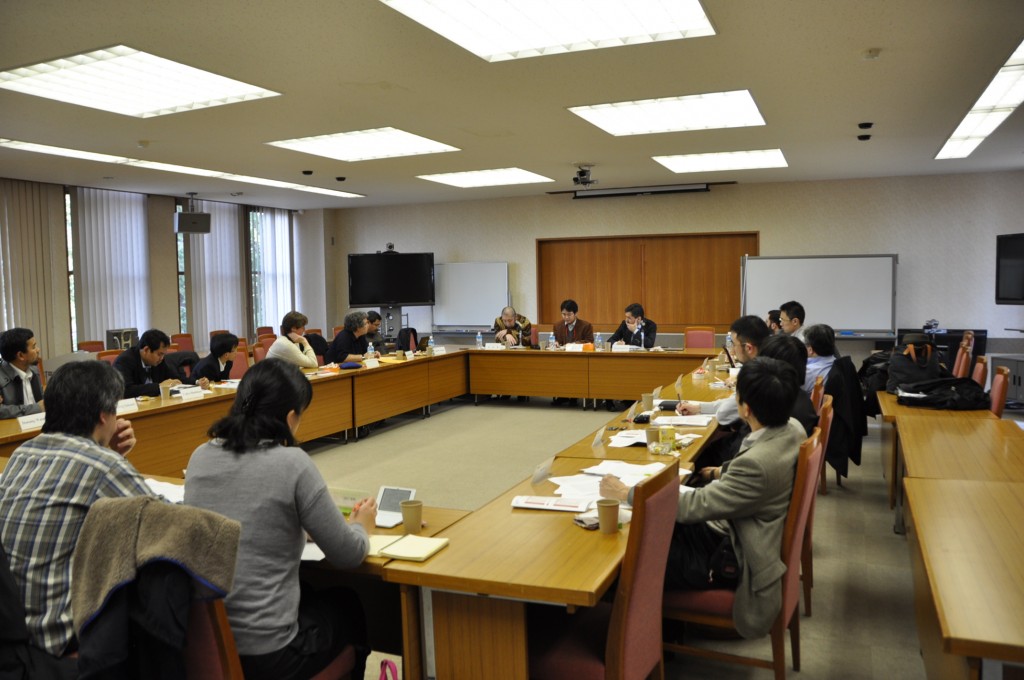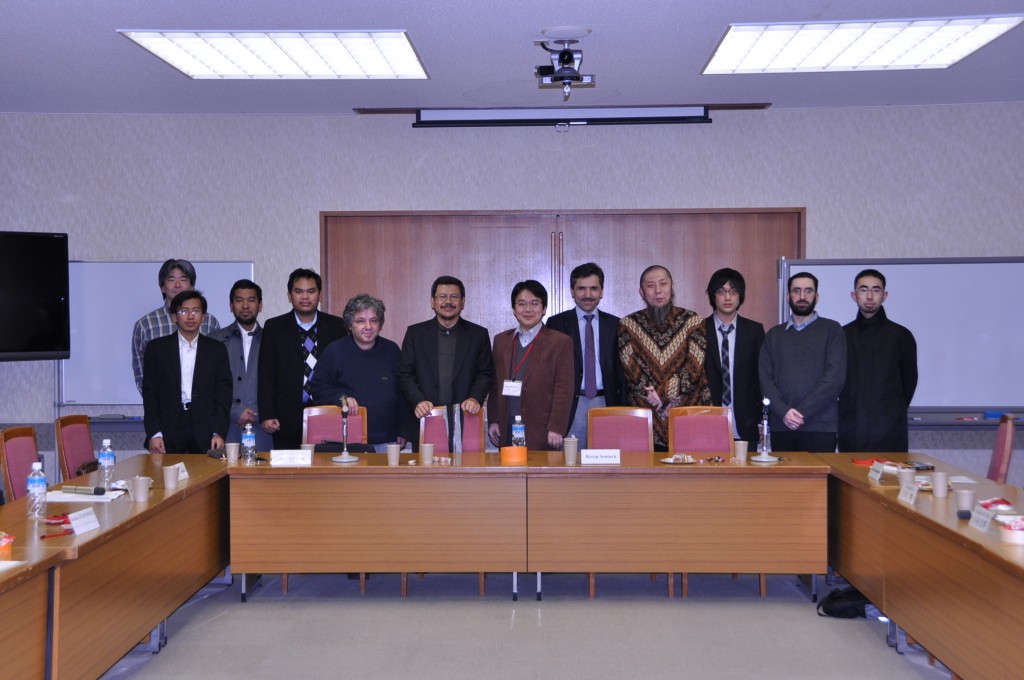Center for Interdisciplinary Study of Monotheistic Religions(CISMOR)Doshisha University
> Past Research Activities > Islamic World and Globalization−Beyond the Nation State the Rise of New CaliphatePast Research Activities
Closed Workshop
Islamic World and Globalization−Beyond the Nation State the Rise of New Caliphate
| Date: |
2011/03/12 15:30 − 18:30 |
|---|---|
| Place: | Room F106, Fuso-kan 1F, Imadegawa Campus, Doshisha University |
| Speaker: |
|
| Commentator: |
|
| Summary: | |
|
Presentation 1: Hamit Bozarslan "The end of caliphate: Turkish debates of 1924" Dr. Hamit Bozarslan discussed the background to the official abolishment of the Caliphate by Mustafa Kemal Atatürk (1881–1938), a leader of the Turkish national movement and the first president of the Republic of Turkey, focusing on the Kemalists and anti-Kemalists within a historical perspective. According to the lecturer, the Caliphate had already been considered obsolete by 1924 when it was abolished. The focus of discussions in those days was the future of the Republic of Turkey, while the legitimacy of the Caliphate was given only secondary importance. The Ottoman Empire recognized itself as a successor state to the Roman Empire rather than as a leader of the Islamic world, and it defined itself as an “empire,” deeming Istanbul the capital of the “third Rome.” The fact that the Caliphate had already lost political importance by 1924 can be clearly seen in the earlier discussions held between Kemalists and anti-Kemalists. The lecturer argued that Kemalists and anti-Kemalists contended mainly over whether Kemalism should be regarded as a revolutionary movement, a Westernization movement, or as Turkism, and paid little attention to the legitimacy of the Caliphate itself. According to Dr. Bozarslan, only Kemalists gave serious consideration to the Caliphate in those days. As nationalists, the Kemalists took a hostile view of the Caliphate in the wake of the surrender of Mehmed VI to the Western allies. In the view of the Kemalists, caliphs were non-institutional beings, unsuitable for modern society, who had been given only nominal political power historically. They also regarded caliphs after the period of the Rightly Guided Caliphs as unjustifiable—a group that had made no contribution to the development of Islamic theological wisdom and that had no religious legitimacy. The lecturer found it paradoxical that the Kemalists who embraced the principle of secularism (laiklik) discussed the Islamic legitimacy of the Caliphate. Anti-Kemalists criticized Kemalists for their radical, revolutionary nature or for their belief in Westernism or Turkism, but they did not address the issue of the Caliphate. Even among anti-Kemalists, there was no one who attempted to support the Caliphate because of its lack of political importance. During the period from the 1920s to the 1950s, various movements were launched to resist Western colonialism, but no major actions were taken to back up the Caliphate. The decision to abolish the Caliphate in 1924 was not met with any objection from either Arabic countries or the rest of the Islamic world—excluding India, where minor movement to resist the decision took place. In today’s Turkey, various topics, including the Armenian problem, EU accession, and democracy, are under heated discussion, but no heed is paid to the issue of the Caliphate. While the lecturer recognized the possibility for Islamic groups such as the Muslim Brotherhood and Nurcu to intensify their activities in contemporary Turkey, he concluded that the vision of a revival of the Caliphate, as a political agenda, would by no means become a reality. In the discussion that followed, disagreement was expressed regarding the view of the lecturer that the Caliphate historically had no political importance. In addition, a lively exchange of opinions took place concerning the treatment of the members of the Liberation Party (Hizb al-Tahrir) and also as to whether the abolishment of the Caliphate had been attributable to an external or internal mechanism. Presentation 2: Ismail Yusanto "Establishment of Khilafah in Indonesia, Current Opportunities and Challenges" In his capacity as a spokesman for the Indonesian Liberation Party (Hizb al-Tahrir Indonesia), Mr. Ismail Yusanto discussed: (1) the possibility for the Caliphate to be established in Indonesia, (2) the obstacles to the establishment of the Caliphate, and (3) the activities of Hizb al-Tahrir Indonesia. Mr. Yusanto is convinced of a revival of the Caliphate as a political agenda in light of the following: the passage of the Qur’an that promises the glory of Muslims; the prediction of a revival of the Caliphate in the hadith (the sayings of the Prophet Muhammad); the growing expectations among Muslims toward a revival of the Caliphate; and the expansion of organizational activities geared to establish the Caliphate. The Indonesian Liberation Party aims to establish the Caliphate, first in Indonesia, and is confident of achieving this aim for the following five reasons. First, in Indonesia, widespread support is now given to the Caliphate and the Indonesian Liberation Party. Statistical data shows that an increasing number of Indonesian people have declared their support to the implementation of the shari‘ah, the revival of the Caliphate, and the policy of the Indonesian Liberation Party. A wide range of social organizations, as well, offer their support to the Indonesian Liberation Party. Second, the Indonesian Liberation Party has strong influence domestically and is permitted to act freely within the country, which is in contrast to the Liberation Parties in Middle Eastern countries that are barred from political activities. Third, the current Indonesian government is losing public confidence. Fourth, Indonesia has sufficient population and natural resources to maintain the new Caliphate. Lastly, Indonesia has plenty of experience in implementing the shari‘ah. In Aceh, for example, the shari‘ah had been in place since 840 when the region was brought under the rule of Sultan Abdul Aziz Shah, up to 1903 when the Acehnese sultan surrendered to the Dutch. On the other hand, there are two obstacles that hamper the establishment of the Caliphate. One is the Indonesian government itself. According to Mr. Yusanto, the U.S.-led global governance structure is supported by the following groups: (1) capitalist countries, (2) economic bodies (e.g., the International Monetary Fund, the World Bank) and international trade organizations, (3) multinational enterprises, and (4) the governments of the Third World. As one of “(4) the governments of the Third World,” the current Indonesian government is viewed as an anti-Islamic government that has submitted to the Western hegemony led by the U.S. In recent years, Indonesian people have become increasingly aware of such a nature of their government and have begun to rebel, and the Indonesian Liberation Party has taken this occasion to propagate the superiority of the shari‘ah-based Islamic system of governance, thus encouraging the public to work for the establishment of the system. The other obstacle is the ideology of secularism and capitalism. This ideology is being spread by the Indonesian government in the political, economic, and educational spheres, while the Indonesian Liberation Party, in their ideological struggle (al-sira‘ al-fikri) with the government, is working to enhance political awareness (al-wa‘y al-siyasi) among the public and help them develop a correct understanding of the Caliphate. Mr. Yusanto argued that, considering that those who are opposed to the Caliphate are gradually losing power, there is a greater likelihood for the Caliphate to be established in Indonesia. He concluded his lecture by the remark that the revival of the Caliphate can become a reality within 10 years in light of the influence of the Liberation Party. Following the lecture, participants engaged in discussion on the treatment of statistical survey data in political science, the real political influence of the Liberation Party in Indonesia, and the relevance between Indonesian nationalism and the public’s expectation for the Caliphate. Presentation 3: Recep Senturk "Unity in Multiplicity:Islam as an Open Civilization― Istanbul Approach" Mr. Recep Senturk discussed the possibility of global ethics in Islam from a theoretical perspective, centering on the concepts of “khalifah (caliph),” “adamiyyah (personhood),” and “ummah.” He then focused on the Ottoman Millet system as a historical case where these concepts were put to actual use, as well as the situation of the present Republic of Turkey. In the view of Mr. Senturk, the term “caliph” has been consistently used to mean an “agent of God on Earth,” which is of a more fundamental nature than the position of a statesman of “dar al-islam” (home of Islam) as defined by Islamic law. The term “caliph” in the latter sense can be seen also in the Qur’an. In the Islamic view of the world, man is a “caliph” (agent) of the Creator on Earth and is differentiated from other creations for his “‘aql (reason),” “amanah (trustworthiness),” and “karamah (dignity).” Given these qualities of a caliph, man is naturally provided with properties such as life, fortune, reason, religion, and family. These properties are called “darurat” (fundamental principles) in the basic study of Islamic law and are deemed to be the objects of protection simply by virtue of personhood or adamiyyah, regardless of whether a person is Muslim or not. The concept of adamiyyah was further developed by Abu Hanifa, a law scholar and the founder of the Hanafi School of Islamic law, along with his followers. If we classify people according to this ethical reasoning, it is apparent that Muslims and non-Muslims are not different from each other in terms of quality; instead, an intrinsic continuity can be seen between them. In other words, all people are part of the “ummah (community) of Muhammad,” out of whom those who have responded to the call of Muhammad (Muslims) are “ummah ijabah (ummah that has responded).” Meanwhile, those who have not (non-Muslims) are referred to as “ummah da‘wah” (ummah that is being invited to Islam). Such a universal view of humanity, which is based on the concept of adamiyyah, has been an essential part of the practice of Islamic law. This view underlies the Millet system, a liberal legal system established by the Ottoman Empire as part of its governance law. The term “millet” refers to communities of religious groups that are allowed a certain degree of autonomy. With the Millet system, the Ottoman Empire successfully ruled the multicultural population and protected the rights of non-Muslims as well. The lecturer argued that this system of governance has been taken over by the present Republic of Turkey through the Tanzimat reforms that accelerated the modernization process of the country. The Republic of Turkey has maintained good diplomatic relationships with non-Muslim countries in Europe and Muslim countries in the East. Domestically, the Turkish government places emphasis on democratic values when implementing its policy measures. According to the lecturer, such openness of the present Republic of Turkey stems from the global ethics of Islam that is based on the concept of adamiyyah, or more specifically, the Millet system established by the Ottoman Empire. As the lecturer mentioned, the current system of governance in Turkey can serve as an exemplary model in creating a harmonious global society for both Muslims and non-Muslims. The lecture was then followed by a heated discussion over a variety of topics, such as the differences and similarities between the Western concept of “religion” and the Islamic concept of “deen” (religion), the fundamental purpose of law in Islam, the definition of democracy, and the qualifications for ijtihad (independent interpretation of law). Yohei Matsuyama (Ph.D. student, Graduate School of Global Studies, Tokyo University of Foreign Studies) |
|
|
Program |
|

